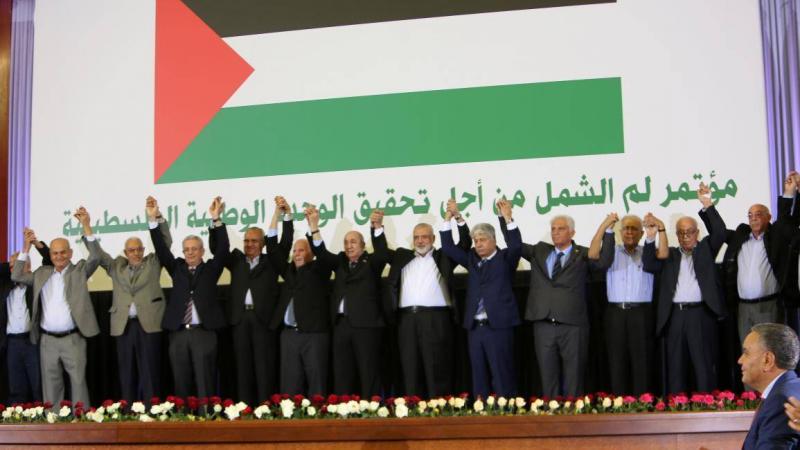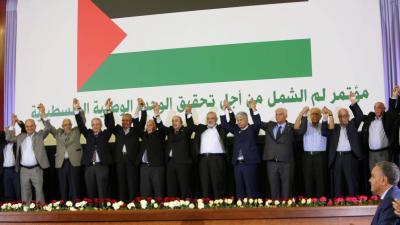Tense atmospheres accompanied statements from officials of the "Fatah" and "Hamas" movements during the recent Israeli massacres in Gaza, reaching a point of accusations of treason and responsibility for the bloodshed, alongside calls from several factions for the Palestinian Authority to retract a presidential statement that jointly held Israel and "Hamas" accountable for the continuation of the war and the resulting casualties. The strained relationship between the two sides is not new and is rooted in history, varying in intensity depending on the phase, peaking in 2007 when "Hamas" forcibly expelled "Fatah" from the Gaza Strip following its electoral victory the previous year. Since then, the divide between them has widened.
Several attempts have since been made to end what is known as the "Palestinian division," with both sides engaging in rounds of talks in Egypt, Algeria, Turkey, Russia, and China. While some made partial progress on contentious points, none ultimately succeeded.
### The Form of Governance
After a previous round of dialogue, originally scheduled for June in Beijing, was postponed at the request of "Fatah," leading to a storm of mutual accusations regarding the impasse in reconciliation, officials from both movements revealed that a meeting among all Palestinian factions will take place at the end of the week, lasting two days in the Chinese capital. The "Hamas" delegation will be led by Political Bureau Chief Ismail Haniyeh, while the "Fatah" delegation will be headed by Deputy Head Mahmoud Al-Aloul. Sources from both sides confirm that "there has been no preliminary meeting between them" ahead of the faction gathering, which may signal further divergence in each side's trajectory.
Naturally, the main agenda of the general meeting is "ending the division," based on commitments previously agreed upon, but the primary goal is to reach an understanding on the governance structure post-Gaza war, especially after "Hamas" officials expressed willingness to relinquish civilian control of the strip in favor of a government of competencies focused primarily on reconstruction.
According to "Fatah" spokesman Jamal Nazal, the agenda includes eight points. Nazal told "An-Nahar Al-Arabi" that "the most important issue to be discussed is the commitment to the Palestine Liberation Organization (PLO) as the sole legitimate representative of the Palestinian people, the accession of 'Hamas' and Islamic Jihad to the organization, adherence to the organization's commitments and signed treaties, the handover of crossings to the legitimate authority, meaning the Palestinian Authority, activating a joint committee to provide assistance to the people of Gaza, in addition to stopping incitement."
Nazal affirms that the atmosphere within "Fatah" is positive regarding the potential for progress in the meeting, hoping that "the circumstances have matured Hamas's thinking. Because success cannot occur without national unity." He clarifies: "Common ground exists, neither Hamas nor Fatah can govern alone. What alternatives are there to reconciliation and unity?"
In contrast, observers express pessimism regarding the likelihood of the two Palestinian organizations achieving a tangible breakthrough to bridge the deep gaps between them. Meanwhile, "Hamas" remains more reserved regarding the meeting and its agenda. A source within the movement stated to "An-Nahar Al-Arabi": "We hope for the best, but we cannot speak now of significant progress being made at the meeting in light of the positions issued by the presidency and officials in the Palestinian Authority."
### The Host
The "Hamas" official noted that "China is the entity inviting the meeting, and we all responded to it, but the factions did not seek to convene this meeting." The paradox lies in Beijing not confirming the meeting's date, nor whether it would take place at all; the Chinese Foreign Ministry spokesperson, Lin Jian, merely stated that "the country will publish information at the appropriate time," and it is ready "to provide opportunities for reconciliation and unity among all Palestinian parties through dialogue and negotiation," indicating Chinese caution against any party obstructing or withdrawing from the dialogue.
Nevertheless, it appears that China, which has been expanding relations and influence in the Middle East for years, is the biggest beneficiary of hosting the meeting, which serves to promote itself as a mediator on the global stage, following its previous success in achieving diplomatic rapprochement and difficult reconciliation between Iran and Saudi Arabia.
In conclusion, it is unlikely that the anticipated meeting, if it actually occurs, will achieve a significant breakthrough towards a long-term reconciliation between "Hamas" and "Fatah" given their differing ideologies, goals, and paths. However, preliminary agreements on contentious points, including a post-war government likely composed of non-partisan competencies, may emerge. Issues such as responsibility for crossings or the disbandment of "Al-Qassam Brigades" are currently difficult to advance. Assuming both movements reach an agreement on disputed files, what would be Israel's stance, which fundamentally rejects any form of participation by "Fatah" and "Hamas" in governing Gaza in the future?




